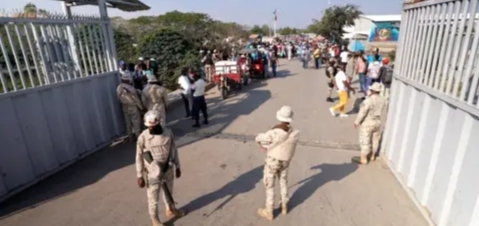
Haitians at border
Fear and chaos await Haitian migrants forced back over border
At the Dajabón border crossing between the Dominican Republic and Haiti, a constant stream of trucks pulls up carrying undocumented Haitian migrants, who are being deported back to their home country.
They are being sent to a nation in the grip of its most acute humanitarian crisis since the devastating earthquake in 2010, which killed hundreds of thousands.
“I’d been in the Dominican Republic for three years,” yelled construction worker, Michael Petiton, “they came into my house and took me from my home.”
He worked hard, he insisted, doing a job most Dominicans did not want. Now he is back in Haiti with only the clothes on his back and a few tools he managed to salvage in a rucksack, reports BBC.
Haiti’s already precarious situation has quickly deteriorated over the past weeks as gangs have launched coordinated attacks on key facilities to force the resignation of the country’s prime minister.
In total, more than 350,000 people have been internally displaced in Haiti – more than 15,000 of them in the last fortnight.
Yet here at the border crossing, the Dominican authorities have been sending back hundreds of undocumented Haitians every day.
Dominican soldiers unlock the wrought-iron doors, order out dozens, and send them across the Massacre River into Haiti.
Some of the immigrants are furious, shouting indignantly in Spanish and Creole. Others are resigned, holding their children or a few possessions in their arms.
The message the Dominican Republic appears to be sending is no matter how bad things become at home, Haitians should not seek refuge on Dominican territory.
Last month, the country’s president, Luis Abinader, demanded in an appearance before the United Nations Security Council in New York that the international community step up aid to Haiti and deploy a multinational force there.
He urged the UN to “fight together to save Haiti”, but warned that if no help was forthcoming, his country would “fight alone to protect the Dominican Republic”.
Questioned last week about the possibility of receiving Haitians fleeing unrest, Mr Abinader categorically ruled out accepting refugee camps on Dominican soil.
“The current situation in the capital city, Port-au-Prince, is a humanitarian catastrophe for its three million inhabitants, and more specifically for women and girls,” said the UN Population Fund (UNFPA)’s Haiti representative, Philippe Serge Degernier.
The widespread gang violence has forced many hospitals to close and others are not functioning as fuel and essential medical supplies are held up by the criminal groups.
Mr Degernier told the BBC that just one of the 15 hospitals his organisation supports was currently working.
“They’re overwhelmed,” he said. “We have estimated that about 3,000 women will not have access to maternity in order to give birth unless the situation calms down soon.”
The hope was that some degree of calm might return after the beleaguered prime minister, Ariel Henry, finally acquiesced to the diplomatic pressure and the bloodshed, and resigned.
Gang violence has surged in the Haitian capital, Port-au-Prince
While the violence has abated a little since the announcement on Monday, few have any doubt that it could flare up again at any moment.
Haiti’s crisis runs far deeper than the resignation of one man. Earlier this week, the US State Department had said that it expected a transitional council to be in place within two days.
